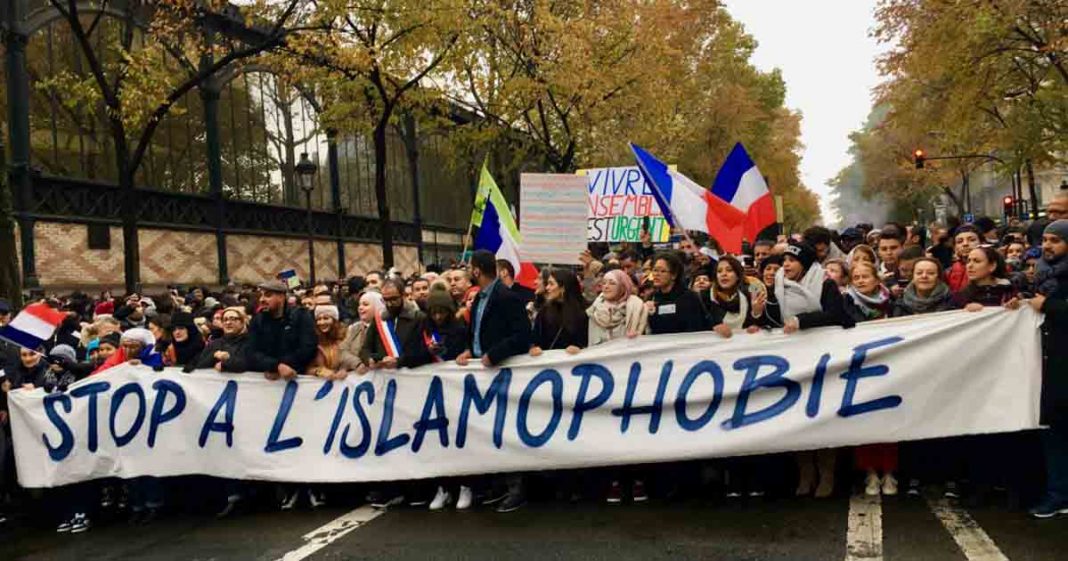In France, tensions over Islam, secularism and freedom of speech (right to offend) have garnered attention of scholars and global civil society. As three people were stabbed to death at a church in the French city of Nice on Thursday, the country has raised its national terror alert guidance to its highest “emergency” level, and up to 4,000 military personnel will be deployed to boost security at schools, churches and other places of worship.
Notably, a French high school teacher was killed on Oct. 16 by an 18-year-old Muslim refugee. The teacher had reportedly caricatures of the Prophet Muhammad (P.B.H) to class.
French President Emmanuel Macron has said that France “will not give into terrorism”. “Very clearly France is under attack,” Macron added.
GVS News Analysis explains reasons behind Macron’s Islamophobic politics, rise of assertive secularism in France, and what can the Muslim world do to counter it.
What has happened?
Macron has sparked outrage across the Muslim world by accusing French Muslims of “separatism” and describing Islam as “a religion in crisis all over the world”.
The matter escalated after Macron said his country would not “renounce the caricatures” of Prophet Muhammad in the wake of the killing of a French teacher who showed them to his class.
Turkish President Recep Tayyip Erdogan has criticized Macron, saying the French leader needed “mental checks” over his attitude towards Islam.
Read More: No ‘niqab ban’ in schools ordered German Court, slammed Islamophobia
Across the Muslim world, some leaders have condemned France and Macron, including Saudi Arabia and Iran; while tens of thousands have attended protests in Bangladesh calling for a boycott of French goods.
Self-criticism of Muslim societies is needed, argues Prof. Kuru
GVS asked Prof. Ahmet T. Kuru as to why is Macron issuing these controversial statements at this moment? “The broad background of French President Emmanuel Macron’s controversial speech,” opines Prof. Kuru, “includes French assertive secularism, which aims to exclude religious symbols from the public sphere, and Islamophobia, which has been increasingly affecting French politics”.
“The more specific reason for the timing of Macron’s speech is his competition with Marine Le Pen, the leader of National Rally, France’s anti-immigrant and Islamophobic party,” Prof. Kuru pointed out. “Macron is trying to appeal right-wing voters in order to win the next presidential election in April 2022, in less than 18 months,” he added.
When asked how he views Turkey’s clear and tough response to the rise of Islamophobic politics in France, Prof. Kuru explained why it is not sufficient. “Turkey does not have a response based on a strategy,” he said.
“The main purpose of the Turkish government’s reaction to Macron is to cover up its deepening economic crisis and ongoing human right violations. In order to keep his popularity high, despite his economic and political failures, President Tayyip Erdogan is using the debate with Macron. Previously, he used certain rhetorical debates with Israeli Prime Minister Benjamin Netanyahu for the same purpose,” Prof. Kuru argued.
He also maintained that “both Macron and Erdogan seem to be happy with this rhetorical debate because both hope to gain the support from their nationalist constituencies”. “In reality, the debate does not help the future of France or Turkey, but, unfortunately, politicians are short-sighted; they do not primarily care about the future of their societies,” he added.
Read More: How can Muslims stop living in history? GVS Exclusive Interview with Prof. Ahmet T. Kuru
GVS asked Prof. Kuru as to what can the Muslim world and Muslim public intellectuals do to present their case?
“We need a serious analysis, which includes both the criticism of France and the self-criticism of Muslim societies,” he said. “We should ask why Muslim societies have long-lasting problems of authoritarianism, poverty, and insufficient schooling. We should ask how Muslim societies can have more Nobel Prize winners, innovators, influential intellectuals, and world-renown artists,” Prof. Kuru concluded.
Why are Muslims frustrated?
Ahmed Ali Naqvi, a Lecturer in Political Science at University of the Punjab, Lahore, opines that “the Muslim world is polarized both vertically and horizontally. However, in this particular case ruling elites in most of states are less offended than the common people. This is chiefly due to the undemocratic character of the Muslim world”.
He also believes that “it is also important to note that mostly non-Arab Muslim states are more critical than the Arab ones”. This distinction is important to understand why this reaction has limited affect globally, Naqvi added.
“In my view,” Naqvi said, “this reaction was always expected which represents a frustration caused by the socio-political and economic conditions in the Muslim majority state but I would maintain that reaction is inappropriate because instead of resolving the problem of Islamophobia, it will only sharpen it”.
To address the challenge of Islamophobia, Naqvi suggests that “the better option would be to focus on the western societies; they should be explained the disappointment (not anger, and certainly not violence) the Muslims feel”. “Narratives are important. People like Macron focus on what their public has to say, not what the Muslim world wants,” he added.
Who developed anti-Islam public imagination?
Saleha Anwar, a Lahore-based political analyst, opines that the problem of Islamophobia needs to be understood in broader academic perspective. “Intellectuals and scholars play an important role in developing popular imagination in any society. As far as the western world is concerned, it has always had a myopic and ill-informed idea of Islam and its relationship with modernity. From Max Weber to Samuel P. Huntington, prominent western scholars saw Islam, not its interpretations, as a challenge,” she argued.
She also pointed out that Huntington, a celebrated American scholar, boldly asserted that “the underlying problem for the West is not Islamic fundamentalism. It is Islam.” Ms. Anwar believes that “the students who have read these scholars or have heard about them would never be comfortable with Muslims and their faith”.
Read More: ‘Islamophobia is a challenge created, developed and aggravated by Muslims’
“There is not much which Muslims can do. It is up to the western scholars, global civil society and public intellectuals to revisit their understanding of Islam. In my opinion, this is the high time to differentiate historical Islam from doctrinal Islam for the greater benefit of humanity,” she maintained.














